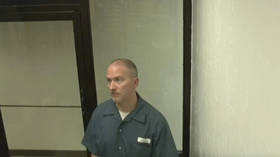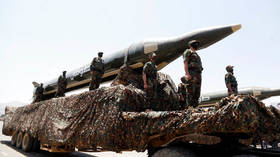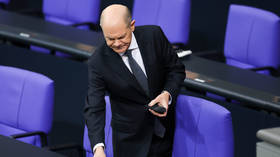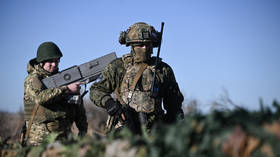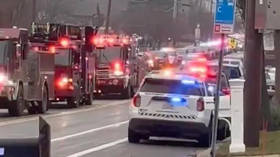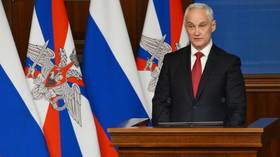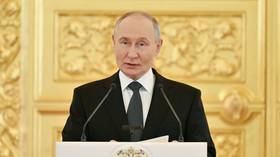‘Calculated to put American troops in danger’: Why US wants escalation in Syria
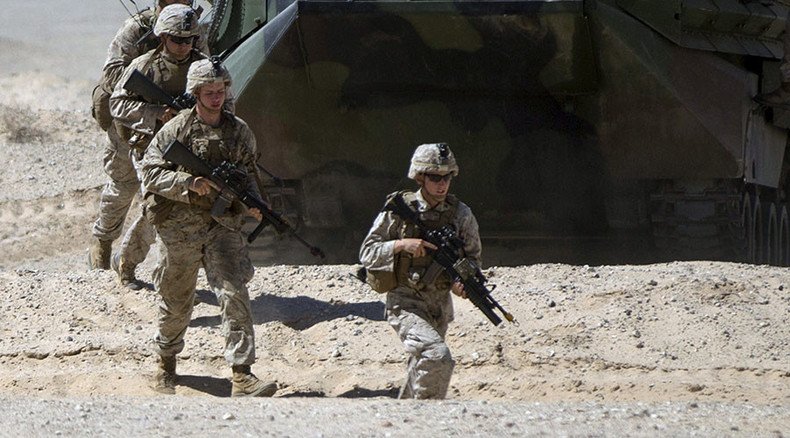
Sending some 50 US advisers to Syria illegally to train the so-called ‘moderate rebels’ looks like a calculated move. If, or when, someone gets hurt, the US will have a pretext for boots on the ground, believes retired US Air Force Lieutenant Col Karen Kwiatkowski.
RT: Does this deployment mean Americans will be putting themselves in the direct line of fire in Syria?
Karen Kwiatkowski: I think there is a danger of that happening and I think that is part of why they are going there. I think they are looking for an excuse to up the ante, to send more troops and to have a crisis of some sort. Clearly the president has been lying, and so has Ash Carter, about what their real intentions are. So, in my opinion, I think this is provocative and I think it is calculated to put our troops in danger.
RT: How is that not a combat operation?
KK: Well, special forces are combat. And what the president said [is] they are going to be opportunistic. When you are training and advising, you do not use the word opportunistic. Training and advising is a more steady state situation. So they are using the word opportunistic, they are expecting to get involved in combat operations, and they have sent combat troops to do that. I do not care how they have used the term for non-combat. This is combat.
READ MORE: US ground ops in Syria ‘illegal’, may lead to ‘unpredictable’ consequences
RT: They are going there to support the so-called moderate rebels. We know it hasn't been terribly successful. Why should this make a huge difference?
KK: In terms of helping the moderate rebels – if there are any that we can identify – it is not going to make any difference in that regard. This is about US exercising some power, some limited power that it has, to kind of assert its relevance, particularly in the face of our allies who are asking how we are helping or not helping them.
RT: Sure, but do you thinks this is a game changer or, perhaps, this is a question of timing, because Russia has obviously taken on Islamic State?
KK: I don't think it is a game changer in that regard. It is a gesture to kind of save face in some respects. But there is a real danger, that if our troops, even if it is a limited number, get killed, and if they get killed by, let’s say, Russian fire or something like that, than we have a big problem, that we are not able diplomatically or militarily able to deal with. So it is extremely foolhardy what they are doing. But yes, it is a gesture to show that the US is trying something. But it is a weak gesture and it is a dangerous gesture.
RT: And you mentioned the Russian airstrikes there and, presumably, Americans are saying we do need to speak with the Russians now to say where we are located so we don't get into an incident like that?
KK: You would think that. You would think so.
‘Russia after terror groups in Syria, only hitting confirmed targets’ – MoD https://t.co/crFY6i6lLEpic.twitter.com/isJlCvxiyi
— RT (@RT_com) October 26, 2015RT: But you sound like that might not happen?
KK: If you believe what the president and Ash Carter say, they aren't really seeking out any cooperation with the Russians. So perhaps behind the scenes they are. I would like to think that they care about the lives of our soldiers that they are sending over there and that they would coordinate, but their public rhetoric is that we will not coordinate. That is what I've heard unless something has changed. They are not really interested in coordinating with Russia, anything that Russia is doing in Syria. And by the way remember that it is an illegal act to send our troops into Syrian space, air space or ground space, without the permission of the government of Syria, which we do not have. So this is an act of war on top of everything else that makes this extremely stupid.
RT: Americans clearly don't see that as a big issue, I mean it has been conducting airstrikes, despite it being against international law. It does not seem to matter in this case, at this stage anyway.
KK: It has not mattered in our policy in the Middle East for a long time. But I have pointed out that if our people killed, if we decide to make some sort of case about that, we are in the wrong totally in this, because we don't have permission of the Syrian government to put those troops there at all. They are there illegitimately. So when they get killed or injured or harmed we have a problem in a diplomatic sense.
RT: A public opinion sense too, I mean what was the reaction when the US soldier did die on a special operations mission in Iraq. Was there a big public outcry in America?
KK: No. Two things that I have noticed about this: one is there is no public outcry, not a lot of concern. I haven't seen a lot of attention given to this death. What surprised me was how much Ashton Carter and President Obama paid homage to this particular individual, called him a hero, and this is what we would like to see – some guy running into a fight and getting slaughtered in an illegitimate combat situation, because I think even in Iraq we still have some concerns there about what we are doing. They celebrated it. They tried to put a positive spin on it. American people aren't listening. We have a lot of other different things on in general. The American people aren't interested in what is going on in the Middle East. They don't want to get involved in it. But they really tried to spin the death of this soldier in a very positive way. And, I'm sure, to see if it can be sold. And, as far as I can tell, it was sold. Americans aren't interested, but they haven't really pushed back at the death of this guy. I think we've become inert to it.
Obama considers moving US forces deeper into Syria, Iraq – reports https://t.co/D0LrjNDIB6pic.twitter.com/xCgDuEVukZ
— RT (@RT_com) October 28, 2015RT: Just looking into the future, you foresee a similar thing?
KK: I do. I mean if you go in the middle of a fire storm in an ill-planned situation, then certainly, you can't say that anything the Pentagon is doing in the Middle East is well planned. They themselves admit this. So, yes, it is going to lead to the death of Americans. And given how they spun the death that happened last week we'll see more spinning and, you know, more of Russia as a 'bad guy’ in this situation, as they try to salvage what is left of their Middle East policy in this final year of the Obama administration, in these final months of the Obama administration...I hate to be cynical about this, but it is such a game that they are playing – no good results for our people, no good results for the Syrian people. It is not going to help the exodus of refugees at all. In fact, it will probably make it worse.
LISTEN MORE:
The statements, views and opinions expressed in this column are solely those of the author and do not necessarily represent those of RT.


